BRIDGE-BS - Advancing Black Sea Research and Innovation to Co-Develop Blue Growth within Resilient Ecosystems
EcoScope - Ecocentric Management for Sustainable Fisheries and Healthy Marine Ecosystems
FLORES - Forward Looking at the Offshore Renewables
EuroSea - European Ocean Observing and Forecasting
EU4Ocean - Coalition for Ocean Literacy
International Ocean Governance
SOPHIE - Seas, Oceans and Public Health in Europe
AtlantOS - Optimizing and Enhancing the Integrated Atlantic Ocean Observing System
Sea Change - our ocean, our health
STAGES - Science and Technology Advancing Governance of Good Environmental Status
SEAS-ERA - Towards Integrated Marine Research Strategy and Programmes
CSA MarineBiotech - Coordination Support Action in Marine Biotechnology
EMAR2RES - Cooperation between the Communities of European MARine and MARitime REsearch and Science
MARCOM+ - Towards an Integrated Marine and Maritime Science Community
CLAMER - Climate Change Impacts on the Marine Environment: Research Results And Public Perception
MarinERA - Coordination of National and Regional Marine RTD Activities in Europe
AmpERA - To Foster Prevention and Best Response to Accidental Marine Pollution
FEUFAR - The Future of European Fisheries and Aquaculture Research

Overview
The AtlantOS vision is to create together with the wider international Atlantic Ocean observing community a coordinated, efficient, sustainable and purposeful system for Atlantic Ocean Observation.
Background and Objective
The overarching objective of AtlantOS is to achieve a transition from a loosely coordinated set of existing ocean observing activities to a sustainable, efficient, and fit-for-purpose Integrated Atlantic Ocean Observing System, by defining requirements and systems design, improving the readiness of observing networks and data systems, and engaging stakeholders around the Atlantic. Furthermore AtlantOS aims to leave a legacy and strengthened contribution to the Global Ocean Observing System (GOOS) and the Global Earth Observation System of Systems (GEOSS). AtlantOS will fill existing in-situ observing system gaps and will ensure that data are readily accessible and useable. AtlantOS will demonstrate the utility of integrating in-situ and Earth observing satellite based observations towards informing a wide range of sectors using the Copernicus Marine Monitoring Services and the European Marine Observation and Data Network and connect them with similar activities around the Atlantic. AtlantOS will support activities to share, integrate and standardize in-situ observations, reduce the cost by network optimization and deployment of new technologies, and increase the competitiveness of European industries, and particularly of the small and medium enterprises of the marine sector. AtlantOS will promote innovation, documentation and exploitation of innovative observing systems. All AtlantOS work packages will strengthen the trans-Atlantic collaboration, through close interaction with partner institutions from Canada, United States, and the South Atlantic region. AtlantOS will develop a results-oriented dialogue with key stakeholder communities to enable a meaningful exchange between the products and services that the Atlantic Ocean Observing System can deliver and the demands and needs of the stakeholder communities. Finally, AtlantOS will establish a structured dialogue with funding bodies, including the European Commission, USA, Canada and other countries to ensure sustainability and adequate growth of the Atlantic Ocean Observing System.
The AtlantOS vision is to create together with the ocean community a coordinated, efficient, sustainable and purposeful system. The legacy of AtlantOS will be a BluePrint for Atlantic Ocean Observing, an implementation plan beyond the EU funding period, which is under development with the wider international Atlantic ocean observing community. EMB are contributing authors to a European Strategy for Atlantic Ocean Observing which is in development as a contribution to the BluePrint. This included a workshop on 4-5 June 2018 in Brussels and EMB contributions on European Policy Drivers for ocean observation and ocean observation governance and stakeholder engagement.
Learn more about AtlantOS in this short video.
European Marine Board Role:
- EMB is a co-leader of Work Package 10 “Engagement, Dissemination and Communication” (WP10 is led by KDM; Jan-Stefan Fritz)
EMB has a specific Task (10.6) on ocean observing policy and coordination developments. EMB also supports wider WP10 activities, including development of the AtlantOS Engagement Strategy. This role also involves our representation (Kate Larkin) on the AtlantOS Steering Committee and Executive Board.
Under this task, EMB delivered a strategic foresight paper on AtlantOS in the European context (Deliverable 10.11). This paper looks at the marine science - policy landscape and brings together different policy discussions aimed at the development of a European Ocean Observing System, in the context of AtlantOS, and how this relates to wider Atlantic and global policy drivers and existing and emerging wider ocean observation coordination. It has a European focus, looking at proposed mechanisms and components for ocean coordination and governance and the potential contribution of existing organizations and initiatives. The report serves as a reference document for, and contribution to, the European Strategy on Atlantic Ocean Observing and international BluePrint for an integrated Atlantic Ocean Observing System.
- EMB lead Task 10.6: IAOOS in the Context of a European Ocean Observing System
This task looks into current and emerging governance and coordination of ocean observing systems with a specific focus on the Atlantic Ocean (AtlantOS) and the European Ocean Observing System (EOOS) to strengthen coordination and alignment of Regional ocean observing systems. The report will further develop the vision for an integrated and sustained ocean observing system as articulated in the publications of the European Marine Board, including the strategic foresight paper Navigating the Future IV (European Marine Board, 2013) and the joint EMB and EuroGOOS publication (2008) EMODnet: A vision for an end-to-end, integrated, interoperable and user-oriented network of European marine observation and data systems.
As part of this task, we are also co-leading the development of a European Strategy for Atlantic Ocean Observing , as a European contribution to the BluePrint (AtlantOS and wider Atlantic Ocean Observing legacy).
Related to this, we are also co-Chair of the European Ocean Observing System Steering Group which is led jointly with EuroGOOS. Read more about EMB's contribution to European Ocean Observing here and the EOOS website
Meetings
- AtlantOS Final meeting, 26-28 March 2019, IOC, Paris
- AtlantOS European Strategy workshop, 4-5 June 2018, Brussels, Belgium (EMB co-organizers)
- 2rd annual meeting, 21-23 November 2017, Gran Canaria, Spain
- AtlantOS 2nd annual meeting, 28-30 June 2016, Kiel, Germany
- AtlantOS Kick-Off meeting, 10-12 June, Royal Library of Belgium, Brussels, Belgium
Press release: http://pr.euractiv.com/pr/improved-observations-better-understand-atlantic-128415
Overview:
The overarching goals of the Sea Change project are to bring about a fundamental “SeaChange” in the way European citizens view their relationship with the sea, by empowering them – as ‘Ocean Literate’ citizens - to take direct and sustainable action towards healthy seas and ocean, healthy communities and ultimately - a healthy planet.
Key objectives of Sea Change:
• Compile an in-depth review of the links between Seas and Ocean and Human health based on latest research knowledge outputs.
• Build upon the latest social research on citizen and stakeholder attitudes, perceptions and values to help design and implement successful mobilisation activities focused on education, community, governance actors and directly targeted at citizens.
• Build upon significant work to date, adopting best practice and embedding Ocean Literacy across established strategic initiatives and networks in order to help maximise impact and ensure sustainability.
• Ensure that efforts to sustain an Ocean Literate society in Europe continue beyond the life of Sea Change through codes of good practice, public campaigns and other ongoing community activities.
• Ensure that all activities of Sea Change are carefully monitored and evaluated to ensure maximum sustainability, effectiveness and efficiency.
• Ensure knowledge exchange with transatlantic partners to bring about a global approach to protecting the planet’s shared seas and oceans.
The objectives will be achieved by a closely interlinked programme. Sea Change includes a mobilisation phase engaging with citizens, formal education and policy actors. Crucially the legacy of Sea Change, including continuing knowledge sharing with North America, are embedded within the project.
European Marine Board Role:
EMB is leader of Work Package 1 “Sea Change Fundamentals - Baseline Review” and is involved in Work Package 5 "Mobilisation:Marine Governance".
WP1 will provide the Sea Change fundamentals through the provision of background information on the concept and state of Ocean Literacy, as well as drawing together information on how Ocean Literacy is currently embedded in different sectors of society, such as formal education and current governance. WP1 will provide valuable information that can be used as standalone communications material throughout the project, as well as information to support the mobilisation work packages (education, engagement and governance).
WP5 will engage in a dialogue with key actors of the international marine governance system with a particular focus on Europe and the trans-Atlantic context on the link between human health and the health of the seas and ocean in order to improve decision-making and subsequent policy development.
Key European Marine Board Deliverables:
- A booklet 'Sea Change: Increasing Ocean Literacy', tracing the history of the Ocean Literacy movement and introducing the Sea Change project, developed by EMB and CoExploration Ltd. Download the Sea Change booklet [6.5MB]
- An animation 'Sea Change: Increasing Ocean Literacy', explaining Ocean Literacy and introducing the Sea Change project, developed by EMB and CoExploration Ltd. From Sea Change Project on Vimeo.
- A review of Ocean Literacy in European Maritime Policy, completed by EMB, IOC-UNESCO and CIIMAR. Download the review [1.4 MB]
- A set of factsheets explaining the connections between Human Health and the Ocean, developed by EMB and CEFAS. Download the factsheets [2.9 MB]
- An animation 'Human Health and the Ocean: What's the Connection?', highlighting 5 ways in which the ocean affects our health and wellbeing. These links include climate regulation, food, pollution, medicine and the blue gym effect. The aim of the video is to raise awareness of how the ocean affects our health and therefore the importance of keeping our relationship with the ocean healthy. From Sea Change Project on Vimeo.
Further Sea Change project deliverables can be accessed via the Sea Change website.
Contact at the EMB Secretariat: Email
STAGES
Science and Technology Advancing Governance of Good Environmental Status
Project type: | EU FP7 Coordination and Support Action |
Duration: | 24 months (Sept. 2012-Aug. 2014) |
Budget: | € 1M |
Consortium: | 8 partners |
Coordinator: | Centro Tecnológico del Mar (CETMAR) |
Website: | |
EMB role: | Work Package 4 Leader |
The Marine Strategy Framework Directive (MSFD) is designed to deliver “Good Environmental Status” (GES) in EU marine waters by 2020. This Directive requires that Member States (MS) with marine territories put in place measures to achieve and maintain GES within a defined timeframe and according to eleven key descriptors of environmental status. However, there is a significant knowledge deficit which may hinder full implementation of the MSFD and the achievement of GES in EU waters. The STAGES project is designed to directly address this knowledge deficit.
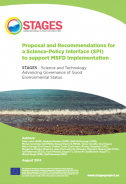 STAGES Proposal for a Science-Policy Interface to support implementation of the MSFD
STAGES Proposal for a Science-Policy Interface to support implementation of the MSFD
The European Marine Board led Work Package 4: “Building a Science-Policy Interface to support MSFD implementation”. A Proposal was developed based on extensive Stakeholder consultation (survey and workshop) and reviews of Best Practice to develop recommendations for an effective long-term Science-Policy Platform for MSFD. The Proposal sets out key components and recommendations for a SPI, together with a roadmap for step-wise implementation. It identifies the need for the SPI to build on existing initiatives and to focus on developing four key areas, namely: Harnessing MSFD-relevant knowledge through a strategic approach to knowledge management; Scientific and technical advice to provide relevant and timely advice to policy makers; Expert evaluation and synthesis of scientific knowledge to assess research needs and gaps and inform foresight activities and research agendas; Knowledge brokerage which lacks recognition and requires specialized skills spanning science, policy and communication. The proposal was presented at the STAGES final workshop on 19 June 2014 and the final version is now available here.
The STAGES project was completed on 31 August 2014. All final deliverables can be downloaded from the STAGES website
STAGES Impact
MSFD Project Coordination Group: On 23 September 2014, EMB presented STAGES and the final science-policy interface proposal to key MSFD stakeholders at a meeting of the Project Coordination Group at DG Environment in Brussels. Participants included representatives of National MSFD Competent Authorities, Regional Sea Conventions and the European Commission. This followed a presentation of the Concept Paper for the SPI to an earlier meeting of PCG on 10 March 2014.
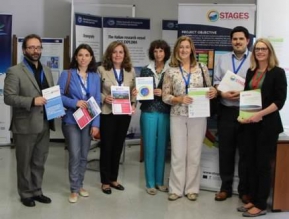
STAGES @ EurOCEAN2014: On 7-9 October, STAGES partners joined some 340 European scientists, policymakers and other experts gathered in Rome for the EurOCEAN 2014 science-policy conference. Coordinator Marisa Fernandez presented STAGES in a session on Good Environmental Status together with presentations by the European Commission DG Research and Innovation, DG Environment, the Joint Research Centre and the OSPAR Regional Sea Convention.In a Plenary session, Maria Betti (Director, Institute for Environment and Sustainability, EC-JRC) launched the MSFD Competence Centre which will act as a science-policy interface for supporting implementation of the Marine Strategy Framework Directive into the future. In the same opening session, Marianne Wenning, Director, Directorate C: Quality of Life, Water & Air, European Commission DG Environment, presented on ‘Marine ecosystems in Europe - policy objectives for healthy oceans’. The full EurOCEAN 2014 produced a Rome Declaration setting agendas for seas and oceans research.
Photo: STAGES partners and representatives of the European Commission at EurOCEAN 2014 in Rome, 7-9 October 2014. From Left to Right: Telmo Carvalho (EurOcean), Anna Cheilari (EC, DG Environment), Ana-Teresa Caetano (EC, DG Research and Innovation, Marine Unit), Sigi Gruber (EC, DG Research and Innovation, Head of Marine Unit), David Murphy (AquaTT), Kate Larkin (European Marine Board).
WP4 Stakeholder Consultation
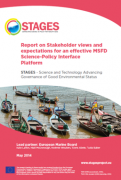
To achieve full community input to the science-policy interface proposal, WP4 led by EMB conducted an extensive stakeholder consultation in 2013 and 2014. This took the form of a consultation survey, in-depth interviews with key actors and a stakeholder workshop. The methodology, analysis and results are presented in STAGES Deliverable D4.1.
Between 31 May and 17 July 2013 the European Marine Board launched an online Consultation on the MSFD science advisory process (Task 4.1). The survey was sent to European marine stakeholders working at a European, Regional and National levels. 112 full responses from 26 countries were received by the close of the survey with representatives from numerous marine sectors including; navigation and shipping, tourism and leisure, marine science/research, government, marine policy , fisheries and aquaculture, conservation, extraction, energy and marine spatial planning.
On 12 February 2014, the EMB, in collaboration with the DEVOTES project, held a Stakeholder Workshop in Brussels to further collect views from MSFD stakeholders. Visit the workshop webpage here.
Responses from the full Consultation have been used to assess Stakeholder engagement in the MSFD science advisory process and ways to enhance knowledge uptake. Results have informed the development of a proposal on recommendations for a long‐term science‐policy interface to enhance MSFD implementation (Task 4.2). An advanced draft of this paper was presented to external stakeholders at the final STAGES meeting on 19 June 2014 in Brussels. Stakeholders attending included the European Commission, Regional Sea Conventions, national MSFD stakeholders and industry.
Contact at the EMB Secretariat: Email
SEAS-ERA


 Towards Integrated Marine Research Strategy and Programmes
Towards Integrated Marine Research Strategy and Programmes
Project type: | EU FP7 ERA-NET |
Duration: | 48 months (May 2010-April 2014) |
Budget: | € 2M |
Consortium: | 21 partners from 18 countries |
Coordinator: | MICINN, Spain |
Website: | |
Marine Board role: | Work Package Leader |
SEAS-ERA is as an overarching marine FP7 ERA-NET. Several European strategic fora (e.g. ESFRI) and European Commission’s Communications (e.g. Communication on Joint programming, 2008) have emphasised marine research as a field where major synergistic benefits can be reached by improving the coordination of research and infrastructure investments. SEAS-ERA overall objective is to facilitate the establishment of a stable and durable structure for strengthening marine research across the European Sea Basins. To do so the project brings together 20 major European Marine Research Funding Organisations from 20 countries in the basin regions of the Atlantic, the Mediterranean and the Black Sea, and the Marine Board.
SEAS-ERA aims to:
- Contribute to the establishment of a European Marine and Maritime Research Agenda and to develop a stable European overarching operational structure for its implementation;
- Enhance cooperation between Member States and avoid fragmentation by fostering synergies at regional and European levels towards achievement of Joint Programming;
- Propose a plan for a better and sustainable use of Marine Research Infrastructures;
- Improve science development and its utilization in Europe through human capacity building;
- Enhance public awareness of marine and maritime scientific and policy issues in Europe.
The launch of the SEAS-ERA project confirms the realisation of the impact of the MarinERA FP6 ERA-NET (whose deputy coordinator was the Marine Board), and awareness of the benefits and opportunities for increased cooperation between national funding programmes (see MarinERA legacy publication, April 2009 Download). To ensure that past achievements are integrated in future developments , the Marine Board is leading SEAS-ERA strategic analysis activities.
Contact at the Marine Board Secretariat: Email
Key Marine Board outputs:
- 3rd SEAS-ERA pan-European Strategic Forum (25 February 2014, Brussels) features presentations on key SEAS-ERA ouputs and present a vision for the future marine research at both basin and pan-EU scales. Download 3rd SEAS-ERA Forum Report [2.2MB]
- 2nd SEAS-ERA pan-European Strategic Forum (6 February 2013, Brussels) features the presentations of three Strategic Research Agendas of regional sea basins (Atlantic, Mediterranean and Black Sea), including the research strategy of the Baltic Sea BONUS initiative. The presentations were followed by a number of structured presentations from key stakeholders and concluded with a panel discussion. Participants had an opportunity to learn about and discuss the key research priorities which have been identified for the four regional seas basins, and to contribute to the debate on how these research agendas can be best utilized in guiding regional and pan-European science policy. Download 2nd SEAS-ERA Forum Report [4MB]
- 1st SEAS-ERA pan-European Strategic Forum (7 September 2011, Brussels): the 1st SEAS-ERA pan-European Strategic Forum "SEAS-ERA & JPI 'Oceans': Commonalities and Synergies", was organised by the Marine Board Secretariat. It aimed to: (i) inform the community of the SEAS-ERA and of the JPI 'Oceans' workplans and progress; (ii) articulate how the JPI and SEAS-ERA (and possibly other marine and environmental ERA-NETs) could concretely benefit from, contribute to, and where appropriate, align the activities of one another; (iii) reflect on the structuration of the "funding" component of future marine and maritime collaborations. Download 1st SEAS-ERA Forum Report [5 MB]
- Synthesis report on existing (sub)national (marine) science and technology strategies: this report presents the results of the SEAS-ERA inventory and analysis of existing national and sub-national science and technology strategies. The Synthesis report will inform (i) the development of the Sea Basin Strategic Research Agendas and the development of Common Programmes and Joint Calls. The report was prepared by the Marine Board Secretariat based on the answers to a dedicated questionnaire and the outcomes of a series of consultative meetings with SEAS-ERA partners. Download SEAS-ERA Synthesis Report [4 MB]
CSA MarineBiotech
Coordination Support Action in Marine Biotechnology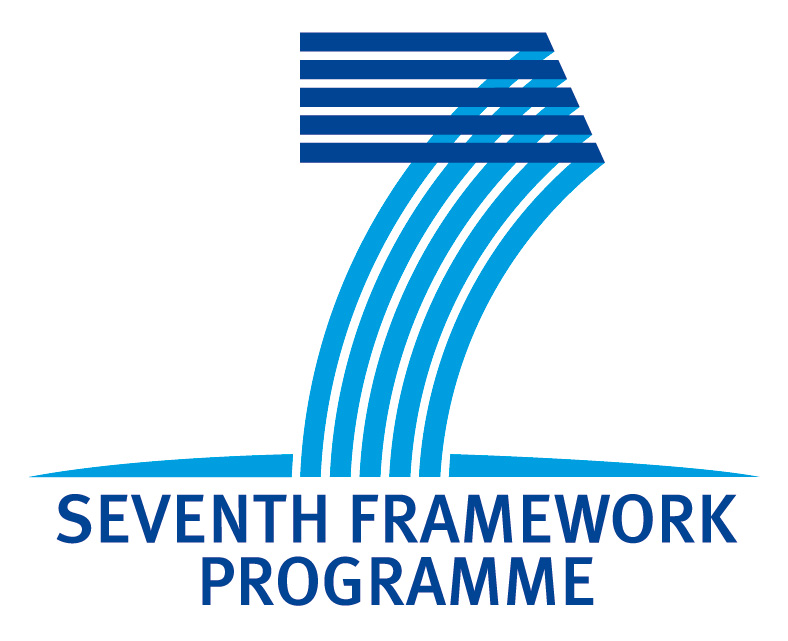

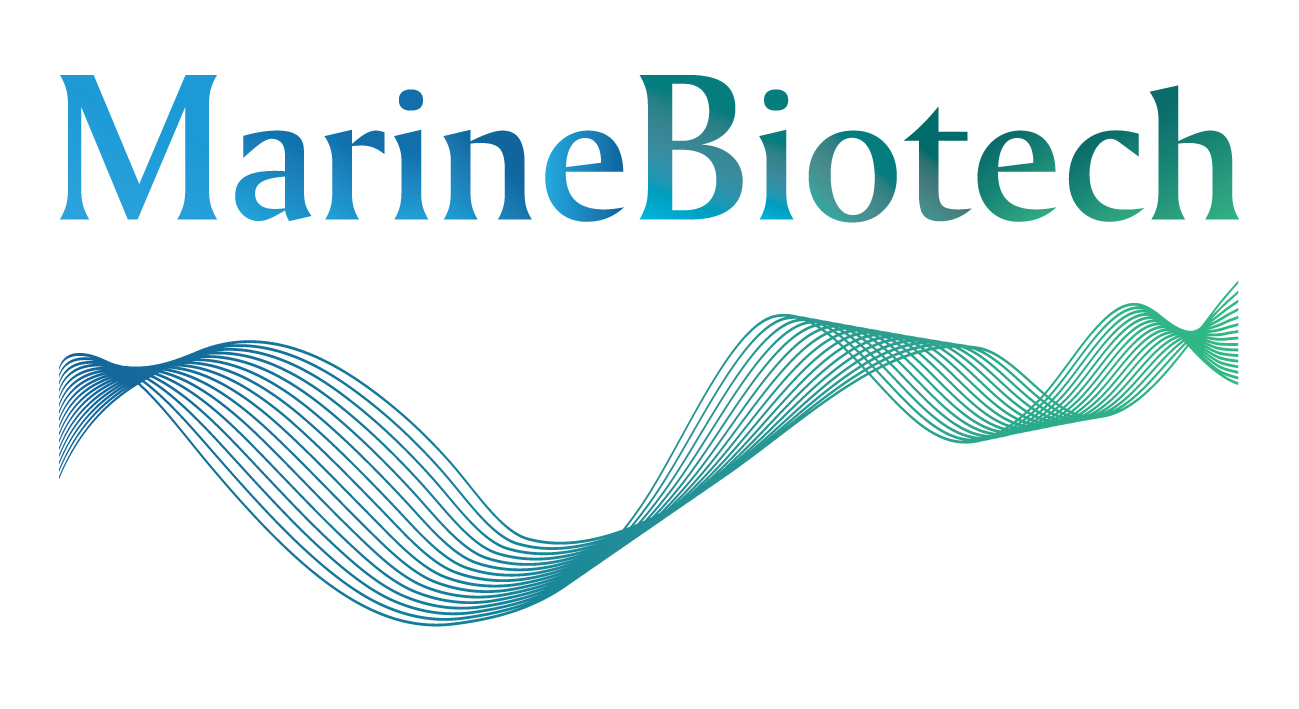
Project type: | EU FP7 Coordinated Support Action |
Duration: | 18 months (Oct. 2011-March 2013) |
Budget: | € 1M |
Consortium: | 11 partners |
Coordinator: | Research Council of Norway (RCN) |
Website: | |
Marine Board role: | Work Package Leader |
Marine biotechnology has the potential to provide a major contribution towards addressing some of the most pressing societal challenges, including environmental degradation, human health and delivering sustainable supplies of food and energy. A sound strategy and a concerted coordination of relevant national and regional RTDI programmes in Europe are urgently needed to allow this potential to be realized.
The main goal of the MarineBiotech project is to reduce current fragmentation and duplication, and pave the way for common programmes and cooperation through a future ERA-NET in marine biotechnology.
The project aims to achieve this, through:
- Mobilization of funding agencies and key stakeholders in the field of marine biotechnology;
- Gaining a better understanding of the marine biotechnology landscape in Europe and beyond;Investigating the potential for future cooperation between funding agencies in the a of marine biotechnology; and
- Developing a common vision for marine biotechnology RTDI.
Final Conference Challenges and Opportunities for Marine Biotechnology in Europe (11-12 March 2013, Brussels)
The final conference of the MarineBiotech project, entitled Challenges and Opportunities for Marine Biotechnology in Europe, took place at Royal Flemish Academy of Belgium for Science and the Arts, Brussels, Belgium, on 11 and 12 March 2013.
This international conference bring together 145 scientists, industry representatives, policy makers/advisors and other key stakeholders involved or interested in Marine Biotechnology research in Europe to:
- Present and discuss critical issues and policy, scientific and industry perspectives relevant to various geographic scales (pan-European, macro-regional, national, sub-national regional);
- Provide insight into some of the most important recent and ongoing European Marine Biotechnology research projects and initiatives and gather lessons learned for the future; and
- Discuss the status and progress in the support and coordination of marine biotechnology research in Europe to inform future policy and coordination efforts.
Conference Sessions addressed among others: (i) Research collaboration challenges and opportunities, (ii) Science policy and coordination: progress and remaining issues, and (iii) Industry-academic collaborations: lessons learned for the future.
The conference also presented the outcomes of the CSA MARINEBIOTECH project and looked forward towards the MarineBiotech ERA-NET. If awarded, the ERA-NET will start late 2013 or early 2014.
More information about the conference: www.vliz.be/projects/marinebiotech/final-conference-csa-marinebiotech
This conference was co-organised by the European Marine Board and Flanders Marine Institute (VLIZ) for the CSA MARINEBIOTECH Project.
EMAR2RES
Cooperation between the Communities of European MARine and MARitime REsearch and Science
Project type: | EU FP7 Coordinated Support Action |
Duration: | 31 months (Nov. 2009-May 2012) |
Budget: | € 0.5M |
Consortium: | 5 pan-European partners |
Coordinator: | Community of European Shipyards' Associations (CESA) |
Website: | |
Marine Board role: | Work Package Leader |
Further to a successful collaboration during the influential EurOCEAN conferences and the Portuguese EU Presidency 2007 Lisbon Conference, the Marine Board joint forces with the maritime research community to participate in the FP7 EMAR²RES project.The EMAR²RES project involves, as consortium partners, the European Associations representing the major waterborne R&D stakeholders and the Marine Board, as key representative of the marine science research community. The project investigates cooperation between marine and maritime research communities with a focus on maritime transport. The partners investigate what kind of appropriate and efficient cooperation would meet help both communities meet the seas and oceans science and technology challenges sustainably and in the context of climate change.
This framework is developed by identifying:
- Areas of common interest;
- Areas of possible synergies (between stakeholders, funding programmes or specific policies);
- Possible structures for long lasting cooperation where operational feasibility and economical sense should be used along with environmental and social impacts to properly assess the overall impact of particular policy/political decisions.
On 22 March 2012, EMAR²RES will hold a joint stakeholder conferences together with another partnership project, MARCOM+.
MARCOM+
Towards an Integrated Marine and Maritime Science Community
Project type: | EU FP7 Coordinated Support Action |
Duration: | 28 months (Jan. 2010-April 2012) |
Budget: | € 1M |
Consortium: | 10 partners |
Coordinator: | ICES |
Website: | www.marinemaritimescienceforum.eu |
Marine Board role: | Work Package Leader |
MARCOM+ aimed to support the marine and maritime science communities to test mechanisms for the establishment of a European marine science partnership that would contribute to developing interactions between partners (Member States, regional authorities, the research community, industry and other stakeholders).The Marine Board participation in the MARCOM+ project was based on its experiences as a facilitator in establishing a sustainable dialogue between the marine and maritime research stakeholders, industry representatives and policymakers and advisers.On 22 March 2012 MARCOM+ held a final conference with another partnership project, EMAR²RES, entitled "Fish and Ships".
MARCOM+ Open Fora
1st MARCOM+ Open Forum (25 November 2010, Brussels)
A the 1st Forum, participants discussed and formulated recommendations on future collaborative mechanisms for marine and maritime research around three key topics:
- Science for Policy,
- Science for Innovation, and
- Science Strategy.
Furthermore, the event provided the first opportunity to reflect on the outcome of the EurOCEAN 2010 and the Ostend Declaration, which called on the EU Member and Associated States and the EU institutions to recognize that "the seas and oceans are one of the Grand Challenges for the 21st Century". Consolidated stakeholders' advice is essential to address such a challenge.
2nd MARCOM+ Open Forum (8 September 2011, Brussels)
CLAMER
Climate Change Impacts on the Marine Environment: Research Results And Public Perception
Project type: | EU FP7 Coordinated Support Action |
Duration: | 18 months (April 2010-Sept. 2011) |
Budget: | € 1M |
Consortium: | 17 partners from 10 countries |
Coordinator: | NIOZ, Netherlands |
Website: | |
Marine Board role: | Work Package Leader |
CLAMER project aimed to raise the awareness of European citizens and society at large to the effects of climate change on the marine environment and their socio-economic consequences. The project built upon the concept that there is a gap between what is known through research and what policy makers and the public know and understand about the impacts of Climate Change on the Oceans; and that this gap needs to be filled to help catalyse formulation and acceptance of the necessary mitigation and adaptation measures for the marine environment.
CLAMER's main outputs
CLAMER Synthesis Report (Marine Board Special Publication)
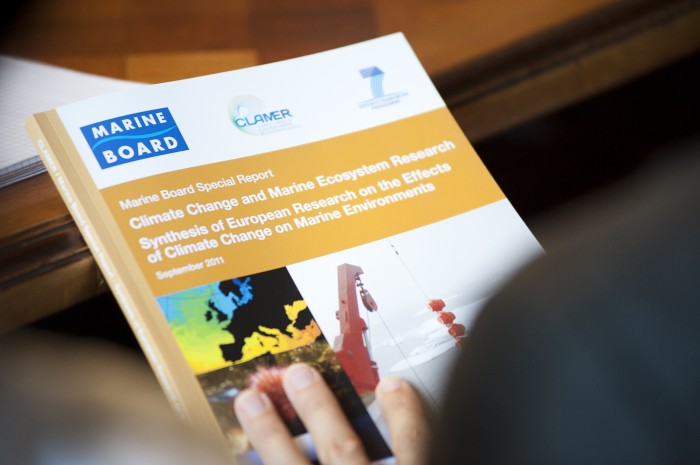 The development of the report was coordinated by the Marine Board Secretariat based on contributions from the members of the CLAMER Scientific Expert Panel (SEP) and additional invited experts. The SEP included some of the main researchers and coordinators involved in key European marine ecosystem research activities during the past decade and several former contributors (incl. the coordinating author) of the Marine Board Position Paper 9 Impacts of Climate Change on the European Marine and Coastal Environment (2007).
The development of the report was coordinated by the Marine Board Secretariat based on contributions from the members of the CLAMER Scientific Expert Panel (SEP) and additional invited experts. The SEP included some of the main researchers and coordinators involved in key European marine ecosystem research activities during the past decade and several former contributors (incl. the coordinating author) of the Marine Board Position Paper 9 Impacts of Climate Change on the European Marine and Coastal Environment (2007).
The resulting 150-page report provides an extensive overview of major recent European climate change research results related to the marine and coastal environment, and highlights research gaps and priorities which need to be addressed by future research or to support future research. The paper targets the scientific community and policymakers, as well as science communicators, providing an excellent basic integrated assessment of the state-of-the-art of the marine climate change research. The report was launched at the CLAMER Conference (see below). Dowload CLAMER Synthesis Report
CLAMER Inventory Report of European Marine Climate Change Research
This deliverable of the CLAMER project provides an inventory of EU-funded projects related to marine climate change research and their results, staring from the beginning of FP5 (1998). The 245-page report developed by the Marine Board Secretariat has provided important baseline information for all CLAMER outputs, but mostly for: (i) Synthesis Report (see above); (ii) CLAMER searchable on-line database (see www.clamer.eu/expertise); (iii) Policy Fact Sheets (see below); and (iv) Project Book (see below). Download CLAMER inventory
CLAMER Policy Fact Sheets
Prepared by the Marine Board Secretariat, the CLAMER Policy Fact Sheets present a selection of five of the key marine climate change impacts: (i) Sea-level rise; (ii) Eutrophication; (iii) Hypoxia; (iv) Temperature Change; and (v) Thermohaline Circulation Changes. The Fact Sheets were presented to the CLAMER Conference participants and will be disseminated beyond the completion date of the project. Download CLAMER Policy Fact Sheets
CLAMER Conference Living with a Warming Ocean: European Research and Public Perception of Climate Change Impacts in the Marine Environment – International High-level Conference, 15 September 2011, Brussels
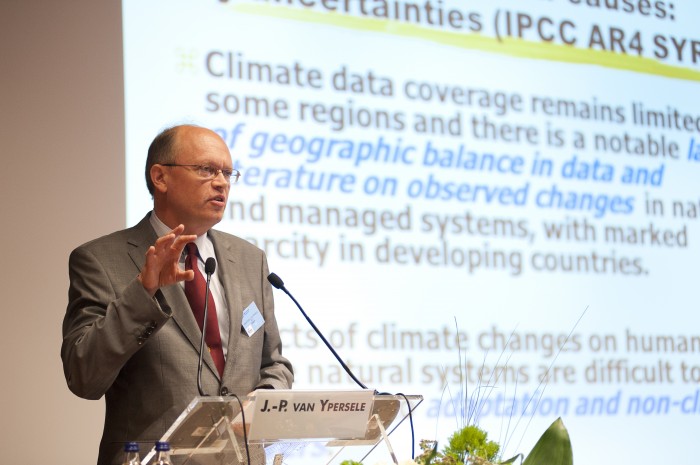 The Marine Board contributed to the elaboration of the programme and running of the Conference which was coordinated by Flanders Marine Institute (VLIZ). Moderated by Quentin Cooper (BBC Radio 4), the Conference attracted 145 participants, including IPCC vice-Chair Jean-Pascal van Ypersele and Prince Laurent of Belgium. Further information about the Conference here
The Marine Board contributed to the elaboration of the programme and running of the Conference which was coordinated by Flanders Marine Institute (VLIZ). Moderated by Quentin Cooper (BBC Radio 4), the Conference attracted 145 participants, including IPCC vice-Chair Jean-Pascal van Ypersele and Prince Laurent of Belgium. Further information about the Conference here
CLAMER poll
The first European poll about public perception of climate change in the marine environment. Over 10,000 people from nine European countries participated in the poll by completing an online questionnaire. Simultaneously, an additional survey was made in Ireland (sponsored by the Marine Institute, the Environment Protection Agency and the Heritage Council of Ireland). The poll results were presented at the CLAMER Conference and published on the CLAMER website.
CLAMER documentary
The 58-minute CLAMER documentary directed by Jean-Yves Collet (Com on Planet), covered a variety of marine climate change topics and included interview with both climate scientists and members of the public from throughout Europe. View the CLAMER documentary
Outreach events
Events were organized in 30 aquaria and marine institutes in 15 European countries as part of the CLAMER communication work package. Find out more about CLAMER outreach events here
Further CLAMER outputs are available on the project's website: http://www.vliz.be/projects/clamer/library.html
MarinERA
Coordination of National and Regional Marine RTD Activities in Europe
Project type: | EU FP6 ERA-NET (Coordinated Action) |
Duration: | 54 months (Nov. 2004-April 2009) |
Budget: | €3M |
Consortium: | 16 partners from 13 countries |
Coordinator: | IFREMER, France |
Website: | http://marinera.seas-era.eu |
Marine Board role: | Deputy Coordinator |
MarinERA was a pilot EC European Research Area Network (ERA-NET) established to facilitate collaboration between national and regional marine research programmes in Europe. MarinERA contributed to raising a collective awareness of the benefits of, and opportunities for, increased cooperation between national funding programmes and programme managers. As a resulf of this awareness, an FP7-funded marine ERA-NET, SEAS-ERA, was launched in 2010. Marine Board leads some SEAS-ERA strategic activities, ensuring that past achievements are integrated in new developments.
Main MarinERA outputs:
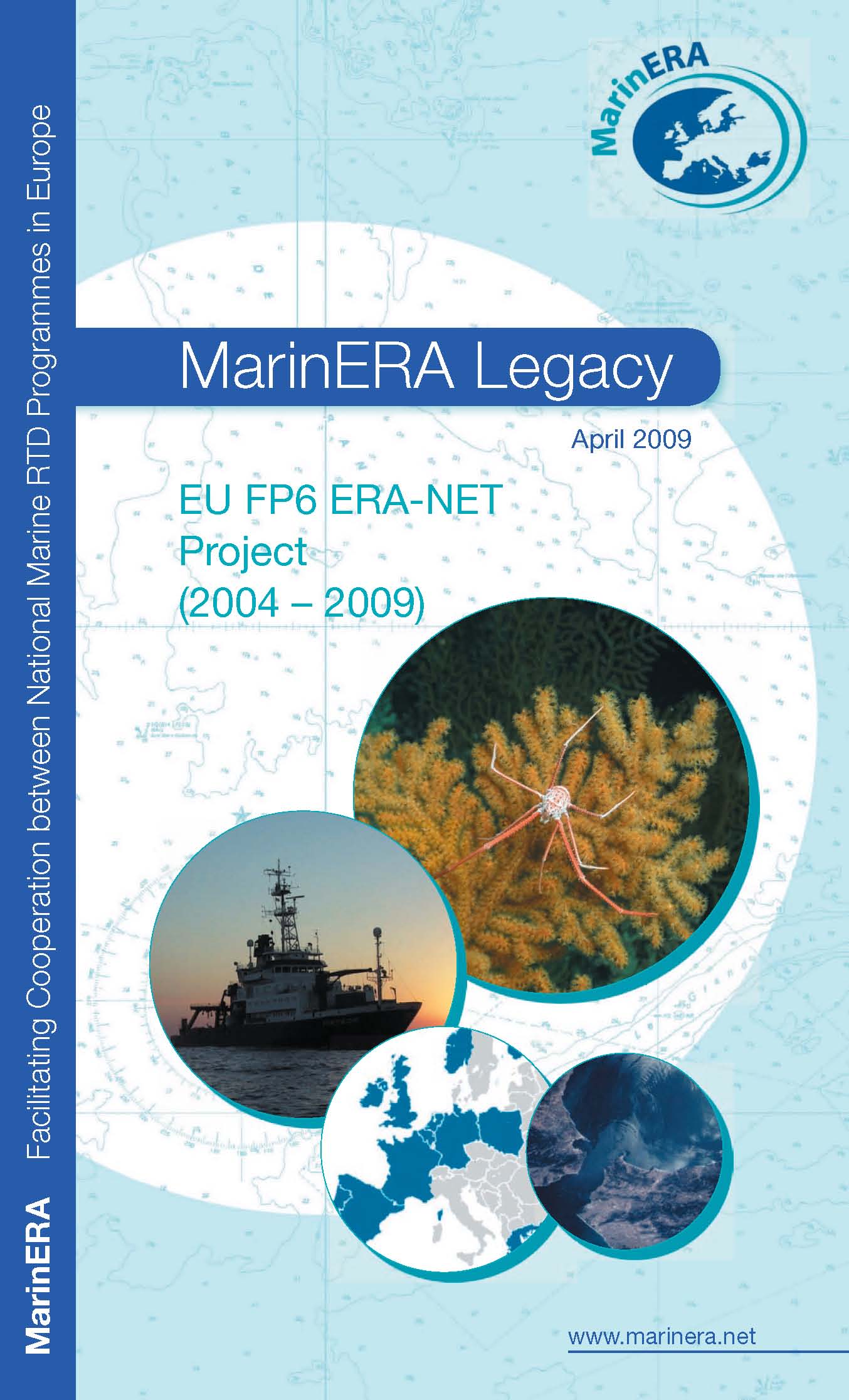 The MarinERA Call for proposals Regional Drivers of Ecosystem Change – the measurement, modelling and prediction of ecosystem change: €4.6M directly granted to five collaborative research projects across five countries. MarinERA projects were were launched back-to-back with MarinERA wrap-up meeting in Paris on 28 January 2009. Download MarinERA Projects' brochure [1 MB]
The MarinERA Call for proposals Regional Drivers of Ecosystem Change – the measurement, modelling and prediction of ecosystem change: €4.6M directly granted to five collaborative research projects across five countries. MarinERA projects were were launched back-to-back with MarinERA wrap-up meeting in Paris on 28 January 2009. Download MarinERA Projects' brochure [1 MB]- MarinERA Projects Database: on-line searchable marine research projects database has been launched by the MarinERA project. The database contains details of over 900 current marine research projects being funded by MarinERA partners. The database provides a unique source of material for marine scientists and policy-makers to access data on current marine research projects, identify potential research partners and nodes of specialist expertise.
- MarinERA on-line Map of Atlantic European Marine Research Centres facilitates closer cooperation in marine research between those Centres, and complements similar regional databases.
MarinERA Legacy publication, prepared by the Marine Board, outlines the output and uptake of the MarinERA poject: Download [1.5 MB]
AmpERA
To Foster Prevention and Best Response to Accidental Marine Pollution
Project type: | EU FP6 ERA-NET (Coordinated Action) |
Duration: | 48 months (April 2005-March 2009) |
Budget: | €1.5M |
Consortium: | 10 partners from 8 countries |
Coordinator: | Spanish Ministry of Education |
Marine Board role: | Task Leader |
AmpERA ERA-NET provided the forum for a EU perspective on accidental marine pollution research. Among its objectives was to enable research to be planned strategically to address the needs for the entire community, not just individual nations, and maximize the outputs from existing efforts.
Main AmpERA outputs:
- The Marine / Environmental ERA-NET Fora: a platform for such projects as BONUS, ECORD-NET, MarinERA and MariFISH, which informed the preparation of the FP7 call for an overarching marine ERA-NET (SEAS-ERA);
- 1st transnational call: resulted in approval of six projects (total funding: €2.5M).
FEUFAR
The Future of European Fisheries and Aquaculture Research
Project type: | EU FP6 Specific Support Action |
Duration: | 20 months (January 2007-August 2008) |
Budget: | €1M |
Consortium: | 7 partners from 6 countries and one pan-EU (Marine Board) |
Coordinator: | IMARES (Netherlands) |
Marine Board role: | Task Leader |
This foresight project aimed to define the research required in the medium term (10 years) to enable sustainable exploitation and farming of aquatic resources.
Main FEUFAR outputs:
The project focused on projecting the future needs for strategic fisheries and aquaculture research. It provided scenarios based on current trends and the requirement of sustainable production, and addressed future policy and research needs.


